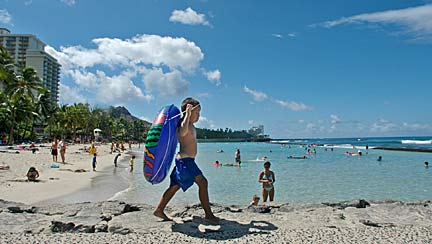
|
Destination Paradise
Americans concerned about
terrorism and safety abroad are
flocking to Hawaii in record numbers
Newlyweds Ty and Kirschel Vollebregt considered their home state of California, Mexico and Europe when deciding where to spend their dream honeymoon. After weighing everything from cost and convenience to distance and drinks, they agreed on Hawaii.
![]()
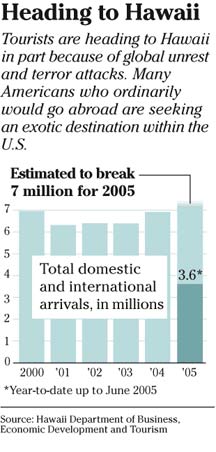
The couple from Dana Point are among the millions of Americans flocking to Hawaii in record numbers this year. Besides the refreshing mai tais, tourism experts say the boom can be credited in part to the global unrest, including terrorism, which has persuaded many Americans to seek exotic travel destinations within the U.S. borders.
Safety, they say, has become a key consideration for globe-trotting Americans.
"We used to say that the motivations for tourists were sea, sun and sand. ... The three new S's are safety, security and sanitation," said Walter Jamieson, dean of the School of Travel Industry Management at the University of Hawaii.
A recent study commissioned by the state found that "safety-security" was the most important factor for Americans choosing a destination. Value and clean environment were second.
"People are looking for something different. At the same time, they want the sense of security that goes with traveling within the United States," Jamieson said.
The Hawaii Marketing Effectiveness Study also showed that Hawaii's image as a safe destination was among the state's strengths, along with scenery, clean environment and being a great place to get away.
"I have no desire to go (abroad) at all. In fact, I don't want to even go to Canada any more," said Steve DeMeyer of Phoenix, who was recently lounging at Waikiki Beach. "I'm happy with America."
Marsha Weinert, the state's tourism liaison, said "there's no question Hawaii is benefiting greatly from sentiments of wanting to travel within the U.S., rather than internationally."
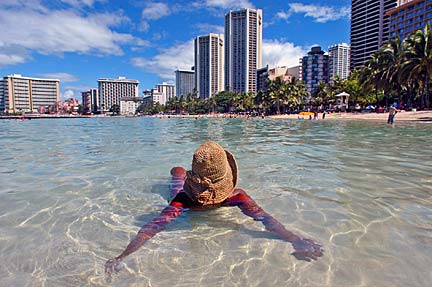
|
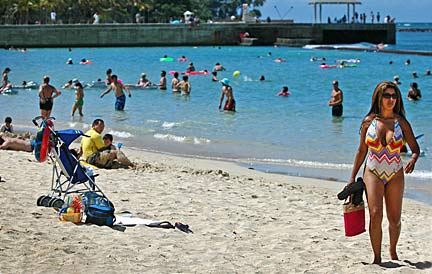
|
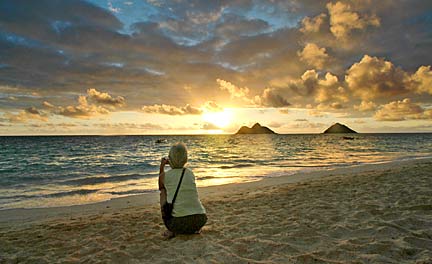
|
The 50th state, with its unique culture, language and history, offers tourists the international flavor they are seeking, Weinert said.
"Still in the United States and protected by Homeland Security, but we're still far away and exotic," said John Monahan, president and chief executive of the Hawaii Visitors & Convention Bureau.
Tourists seem to agree.
"I know I'm still technically still in the states, but I feel I left the country, which is nice," said honeymooner Patrick Colgan, of Seattle. "That does offer something California doesn't."
Colgan said he even enjoys vowel-heavy Hawaiian words.
"Give me a 37-letter word with one consonant. I love it," he said.
Hawaii is on pace this year to break 7 million visitors for the first time ever.
Hawaii welcomed a record 3.6 million visitors in the first half of the year, 7 percent more than the first six months of 2004. And the percentage of American visitors has increased to 66.5 percent during the first six months of this year, from 59.6 percent in 2000.
Some of the events in recent years that have curbed international travel by Americans include the Sept. 11, 2001, terrorist attacks, the recent subway bombings in London, the SARS illness in Asia, the 2002 Bali nightclub bombings, December's deadly Indian Ocean tsunami, the U.S.-led war in Iraq and the weak U.S. dollar against the euro.
"It's not a matter of theory. We now have enough evidence to suggest that either natural or human-caused disasters and crises definitely affect the traveling public," Jamieson said.
The UH professor said the tsunami has been disastrous for tourism in areas like Sri Lanka and Thailand. Bali has also struggled to attract tourists since the bombings there.
Wendy Goodenow, president of the Hawaii chapter of the American Society of Travel Agents, said "people tend to stay closer to home when things get a little hectic out there."
Hawaii has benefited by taking several measures to assure safety and a quick and effective response if something did happen.
"Hawaii is a model -- the (Pacific) Tsunami Warning Center, excellent warning systems for hurricanes, good first-responder services," Jamieson said. "This whole level of providing assurance is important."
But officials in Hawaii acknowledge that travel to the islands could be shattered in a moment. The fragile tourism industry is very susceptible to global events, from terrorism to soaring oil costs.
"One destination's misfortune can be positive for another one, and we're clearly an example of that," Jamieson said. "But those same forces can work the other way."
Erika Yowell, spokeswoman for the Las Vegas Convention and Visitors Authority, said her agency has surveyed visitors about whether they feel safe in the desert destination, which is also experiencing record visitor arrivals.
"By in large, they do feel safe," she said. "Las Vegas is an interesting destination because security is such a visible, integrated part of the experience."
Many tourists interviewed in Waikiki acknowledged that security was on their mind, but say it did not factor into their travel planning.
Axel Langer, of Munich, Germany, who was visiting Hawaii for the first time, said no one can forget about terrorism but it will never prevent him from traveling, including to London.
"I would go tomorrow," Langer said. "Otherwise I would have to only live in my house and wait until the day I die."
Saxon Reynolds, of Upper Marlboro, Md., agreed with Langer's philosophy.
"If it's going to happen, it's going to happen," he said. "If it's my day, it's my day."
E-mail to City Desk
[News] [Business] [Features] [Sports] [Editorial] [Do It Electric!]
[Classified Ads] [Search] [Subscribe] [Info] [Letter to Editor]
[Feedback]
